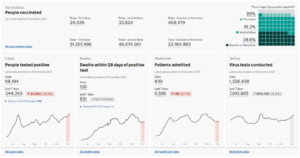Data is essential in today’s world – creation is exponential and its value at all-time highs.

Figure 1 – Graph showing the size of the global data sphere in the last 15 years1.
Why is data so important?
Data allows for insights on areas needing more support. Data ultimately leads to more information. Therefore, more robust data-driven decisions can be made with more reliable and beneficial outcomes. The use of data in healthcare is one of the best examples of how data can be used to change the world and individuals’ lives for the better.
Use of data in the healthcare industry

Figure 2 – Dashboard from the UK gov website showing the covid summary data2
As we all know, healthcare systems worldwide face incredible challenges due to growing and ageing populations, the current global pandemic, increased demand for transparency, and higher expectations from patients. The efficient use of data will aid in the management of these issues, transform healthcare delivery, and help improve patient outcomes.
Healthcare data ranges from more patient-centered examples such as medical/surgical records to institutional level data about healthcare delivery such as staffing schedules.
Examples of Data being used in the healthcare industry
NHS
The NHS is currently undergoing a significant drive in its digital transformation after acceleration during the covid pandemic. The digitalisation progress made during the pandemic included things like the ability to move to some remote working and consultations as well as virtual wards and remote monitoring of patients. This progress is excellent, but much more needs to be done to transform health services and improve patient outcomes. The NHS aims to capitalise on the current momentum and put data and technology at the heart of this transformation3.
NHS Data Solutions
- The creation of coherent data architecture and infrastructure to be followed system-wide is a goal of the NHS. It would make massive differences in the ability to compare, collaborate, and analyse data.
- Improvement of data literacy needs to be a priority. The staff need to be educated and supported.
- Digitalisation of data can improve most services within the healthcare system. For example, scheduling of appointments and staff. This allows staff to spend less time on administrative tasks and to personalise healthcare.
- The implementation of ICSs – integrated care systems, will allow and encourage regions across the UK to coordinate in partnership and remove the existing divisions which lead to disjointed care4.
Personalised Medicine
Personalised medicine is more tailored and responsive to the individual. It allows for faster recovery, more effective application of medicines, more research into new medicines, fewer side effects, and overall better health outcomes.
To produce and implement personalised medicine, vast amounts of robust and accurate data are required. Decisions where people’s lives and health are at stake, must be well informed. This data is then analysed with the support of machine learning algorithms to generate insights and spot patterns 5.
In conclusion, all aspects of healthcare will benefit from using data effectively with the common goal of improving health outcomes. The above examples highlight the benefit to a whole healthcare system.
References
- The Digitization of the World from Edge to Core (seagate.com)
- UK Summary | Coronavirus (COVID-19) in the UK (data.gov.uk)
- Major reforms to NHS workforce planning and tech agenda – GOV.UK (www.gov.uk)
- Putting data, digital and tech at the heart of transforming the NHS – GOV.UK (www.gov.uk)
- Big data for personalised medicine (ternplc.com)







